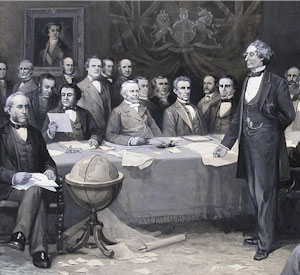To better understand what is happening politically in our country today, it helps to have a basic comprehension of Canadian Constitutional law. To those who are not lawyers, historians, or political scientists, this might sound intimidating. To others who might have suffered through uninspiring high school courses in these topics, it may sound bloody boring. Let me assure you that it is neither; as we shall discover, the story behind the Canadian Constitution is fascinating. When most of us think of the Constitution, we might think vaguely of the BNA Act or the Charter. These are certainly important parts of our Constitution, but they are not the whole story. Other equally vital parts were forged in the Civil War, dynastic struggle and religious quarrels of England, over three centuries ago.
We must begin with the Glorious Revolution of 1688 and the principle of Parliamentary Sovereignty. Canada’s Parliament and provincial Legislatures are fundamental institutions of our government. They take as their template the British Parliament in London. So to understand the role of our Parliament and Legislatures, we need to caste our gaze across the Atlantic for a little English history. It is a gripping tale of clashing ideas laced with ambition and bloodshed. It may seem strange at first blush that a great part of our Constitution derives from English history. But the Parliamentary principles arising from that chronicle are as much a part of our Constitution as the better known Charter, and are no less important.
The full story of the Stuart Kings, the English Civil War, the Commonwealth, the Restoration, and the Glorious Revolution that gave birth to those principles is beyond the scope of this discussion, but a thread of this story must be retold here. It begins way back in the Middle Ages. Gradually, the Magna Carta and a Parliament evolved. Eventually, its consent was necessary to enact laws. But when Charles I became King in 1625, the relationship between the ruling potentate and his Royal Prerogative on the one hand, and Parliament’s power to enact laws on the other, was unsettled. For a decade, Charles I governed without a sitting Parliament; he was effectively a dictator, an ‘absolute monarch’. During these years of Personal Rule, he claimed the prerogative power to govern without summoning Parliament. When circumstances finally compelled Charles to reconvene Parliament in 1640, it was flooded with petitions denouncing the imposition of taxes (ship money) through the prerogative, the invasion of liberties through prerogative courts (the notorious Star Chamber), and other capricious laws. Complex financial, religious, and social turmoil boiled over during this period, and those who dared challenge Charles I risked disputing the Crown’s prerogative.
When the rift between Charles and Parliament sparked Civil War in 1642, the ultimate issue was whether the king should govern as a god by his will, and the nation be governed by force, like beasts, or whether the people should be governed by laws made by themselves and live under a government derived from their own consent. The Parliamentary army, led by Oliver Cromwell, swept all aside. Charles I surrendered. By then, the army was master and it purged those in Parliament who had the temerity to question its authority. They were arrested or barred from their seats. The “Rump” that remained demanded the king’s trial. He was charged with, among other things, “tyranny”, and making war against Parliament. He was famously tried in the House of Commons.
Charles cleverly contended that his judges had no legal jurisdiction to try him. The transcript of the charges leveled against him and his answers were recorded for posterity. They reveal his haughty retort to his accusers that they were ‘exercising power without law’:
“For if power without law may make laws, may alter the fundamental laws of the kingdom, I do not know what subject he is in England that can be sure of his life or anything that he calls his own…I see no House of Lords here that may constitute a Parliament…a king cannot be tried by any superior jurisdiction on earth.”
Charles’ complaint was directed at the lack of authority which the House of Commons held to try him. Charles was on firm ground in challenging the jurisdiction of his adversaries. Parliament was not properly constituted by the House of Commons alone, and in the tradition of the British Parliament, could not enact law without the House of Lords and the king. The House of Lords refused its consent to prosecute their king. The principle raised by Charles is also broader than the narrow jurisdictional point. His remarks remind us that there are fundamental laws in our legal tradition, and that these must be respected. Law made absent proper regard for such fundamental laws is illegitimate. It is instead an exercise of raw power, which alone provides no assurance of life or property. It lacks legitimacy and cannot command our respect. Power alone, unbridled by law, is the very tyranny of which Charles stood accused.
The words of Charles I still resonate today. They require us to recall that power and law are two distinct things. They recognize that state institutions can exercise power unlawfully. They acknowledge that there are still fundamental laws which even the powerful must obey. What makes these words particularly relevant is that they were uttered as the constitutional relationship between Parliament and the king was being shaped. Soon after this trial, Parliament’s role would be confirmed as fundamental law.
Charles’ defense was futile. Power triumphed. He was beheaded on 30 January 1649. The House of Commons did away with the king and the House of Lords. Then in 1653, Cromwell even dispensed with the House of Commons. His soldiers emptied the Chamber. England was then ruled by one man and his army until the Lord Protector Cromwell died in 1658, leaving the future government in doubt. Civil war threatened again, but a new Parliament was elected. It sent for Charles’ son, waiting in exile since his father’s execution. The issues that gave rise to the original conflict remained unresolved, so that when Charles II died without an heir in 1685, his brother James assumed the throne. James II was a converted Catholic in a country that had broken away from Rome during the reign of Henry VIII. Like his father, he determined to rule without Parliament and override its religious laws. Once again, the Royal Prerogative clashed with the law made by Parliament. The English under James II came to fear popery and slavery. Civil war again loomed, but leading men supported a Protestant grandson of Charles I. The Dutch William of Orange and his wife Mary landed in England in November of 1688. The army abandoned James, who fled and spent his remaining years in exile.
The great issues which had occupied England for a century were finally resolved. When William and Mary ascended the throne in 1689, they accepted a Declaration of Rights later enacted in a Bill of Rights, limiting the Crown’s prerogative powers. The preamble to the Declaration of Rights accused King James II of endeavouring to “extirpate the Protestant religion and the laws and liberties of this kingdom”. It went on to declare a number of ancient rights, many of which were directed at controlling the prerogative and confirming the primacy of Parliament:
That the pretended power of suspending of laws or the execution of laws by regal authority, without consent of Parliament, is illegal;
That the pretended power of dispensing with laws or the execution of laws, by regal authority, as it hath been assumed and exercised of late, is illegal; That levying money for or to the use of the Crown by pretense of prerogative, without grant of Parliament, for longer time, or in other manner than the same is, or shall be granted is illegal;
That the freedom of speech and debates or proceedings in Parliament ought not to be impeached or questioned in any court or place out of Parliament; And that for redress of all grievances and for the amending, strengthening and preserving of the laws, Parliaments ought to be frequently held.
This Glorious Revolution settled the great constitutional question of 17th century England. The Revolution made Parliament supreme. The Crown could not rule without Parliament. Parliament made laws. The king could not alter or suspend them, or make his own. These constraints upon the Crown prerogative migrated overseas to the English colonies. There were differences in Crown authority to rule by prerogative depending upon whether a colony was obtained by conquest, treaty, or settlement, but once the Crown authorized a colonial assembly, the king was precluded from exercise of prerogative legislative authority.
All of this is as foundational to the Canadian Parliament and provincial Legislatures today as it was to England in 1689. Parliament and Legislatures enact legislation which becomes law with the assent of the Crown, given through the governor general in Ottawa or the lieutenant governors in each province. The prerogative power of the Crown does not extend to making laws. Of course, much remained to be done after 1689 before our present system of government fully evolved. The vote had to be extended to a broader electorate. The administration had to be drawn away from the monarch and made subject to Parliament. The Prime Minister and his office were yet to be conceived. All that lay in the future. But the fundamental role of Parliament was finally settled in 1689, and that is the bedrock of our Constitution to this very day.
The Constitution Act, 1867, or as it was once called, the British North America Act, was a statute passed by the British Parliament to establish Canada in 1867. It is another fundamental part of our Constitution. Most Canadians know the story of Confederation, or at least they once did in a less self-flagellating time in this country. The Constitution Act contemplates both provincial Legislatures and a federal Parliament. There is no national government. These institutions were modeled after the British Parliament. The Constitution Act also provides for the division of powers between Ottawa and the Provinces. Jurisdiction is allocated to one or the other.
In 1982, Canada experienced a revolution that was no less profound than the Glorious Revolution of 1688. Whereas the Glorious Revolution confirmed the supremacy of Parliament, the Canadian revolution of 1982 dramatically increased the powers of judges at the expense of Parliament and Provincial Legislatures. Before 1982, our Constitution was based upon the described British traditions. The central pillar of the British Constitution is Parliament, which is supreme. Parliament can pass whatever law it likes, and that becomes the law of the land until Parliament decides that it should be changed. Judges cannot change that law. They cannot overrule it. They can only interpret and apply the laws that Parliament enacts. This is not to say that under the British system, judges are unimportant. For example, questions often arise about what Parliament intended by passing particular laws, and these issues are determined by judges. But under the British Constitution, Parliament has the supreme power to decide what the law shall be. Nobody but Parliament can challenge Parliament or change what Parliament has done. If Parliament thinks judges have not properly interpreted laws, then it can pass another law to set things right.
An important difference between England and Canada is that our nation is a confederation. Canada has provinces with their own Legislatures. England never had other Legislatures, only the Parliament at Westminster in London. The Constitution Act divides legislative jurisdiction in Canada between Parliament and the Provinces. But before 1982, within their respective jurisdictions, Parliament and the Legislatures were still supreme. All of that changed in 1982 with adoption of the Canadian Charter of Rights and Freedoms. The rights and freedoms set down in the Charter are constitutionally guaranteed. By reference to those rights and freedoms, judges can now strike down laws made by Parliament or the Legislatures. In a very real sense judges, and not our elected representatives, are now supreme. Herein lies the danger that was vividly revealed during the Covid-19 Pandemic, during which individual rights and freedoms were consistently disregarded by courts singing a chorus fed to them by governments imposing lockdown measures. Elected representatives are accountable to those of us who elect them. Judges are politically appointed and accountable only to themselves. In applying the Charter, they wield enormous, unchecked law making power. This is basically elitist and undemocratic.
After the adoption of the Charter in 1982, and after a number of early Charter decisions, a debate gradually emerged concerning the new, expanded role of the judiciary in Canadian democracy. Critics suggest that activist courts are pre-empting legislatures and the executive branch of governments, making decisions that were properly those for elected officials, rather than unelected judges selected for their political leanings. Critics were disturbed that because these decisions were constitutional law, they could not be overruled easily—and sometimes not at all—by legislatures. Others responded by saying that judges are not activist, but are merely applying the principles set out in the Charter, a duty imposed upon them by the Constitution.
The democracy gap at the Supreme Court starts with the Prime Minister, who hand-picks the justices appointed to the top court based upon recommendations received from his justice minister. The SCC influences public policy most directly in two ways: by choosing which cases to hear, thereby setting policy priorities, and by striking down or redrafting government laws, policies, and actions. Most years, the SCC hears only about 10 per cent of the appeal applications it considers. In the past several years, the SCC has increasingly embraced the contextual approach to statutory interpretation, which counsels that laws and regulations must be interpreted flexibly, with due regard to diversity and perceived social context.
Even if it does ultimately side with the government on legislative interpretation, as it has done increasingly in recent years, the SCC can still lay the groundwork for future activism by using social context to breathe life into radical ideas that were never approved by legislatures, that were deliberately omitted from the Charter, and that were voted against at the ballot box. One example is the carbon tax reference case. The AB government and other provinces received a clear mandate from their constituents to oppose the federal carbon tax. The Federal government took the Provinces to Court to have the SCC uphold and enforce the carbon tax, and thereby succeeded in effectively expanding the powers of the Federal government into the realm of exclusively Provincial powers such as natural resources and health.
For some, this increasing judicial creativity is cause for celebration rather than concern. After all, is it not the Court’s role to scrutinize executive action, and to advise against laws injurious in their purpose or effects? This judicial responsibility is key to operation of the rule of law; it is enshrined in the Constitution itself, which grants individuals the right to obtain such remedy as the court considers appropriate and just in the circumstances.
The real problem is therefore not with judicial activism, but with the lack of any accountability for such activism. This is especially problematic in the case of activism that advances positive liberty, whereby Charter claimants are rewarded with new, positive rights that carry heavy demands on the public purse in terms of compliance costs, that expand the power of the state, that treat racial or gender groups differently, or that create new categories of discrimination, beyond those which were deliberately established by Parliament.
Greater accountability starts with changing the appointments process. It is inevitable that any such process will be political (as is the current system), and so the challenge is to make it a more democratic and transparent mode of selection. Next comes the need to invite greater resort to the notwithstanding clause as a way of tempering judicial excesses. One way to rehabilitate this clause is to put its use to a referendum at a subsequent provincial election.
Many Canadians are justifiably frustrated at the increasing power of the judiciary, and say that judges have too much power. They think that legislatures and not courts should be making our laws. Meanwhile, the judicial branch continues to grow stronger relative to other means of shaping the direction of public policy in Canada. To point this out is not to judge bash, but rather to call upon judges to defend their activism and for parliamentarians to defend their inactivism.
Perhaps most of all, judges should be held to account for their public statements, like the one made by Chief Justice Wagner in the wake of the 2022 Freedom Convoy in Ottawa:
In his interview with Le Devoir, Wagner characterized the protest on Wellington Street, where Parliament and the Supreme Court are located, as “the beginning of anarchy where some people have decided to take other citizens hostage.” The article reports Wagner as having declared that “forced blows against the state, justice and democratic institutions like the one delivered by protesters… should be denounced with force by all figures of power in the country”.
Leighton Grey is a Senior Fellow with the Frontier Centre for Public Policy. He is also Creator & Host of The GreyMatter Podcast.



